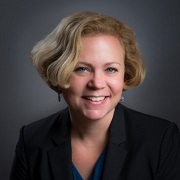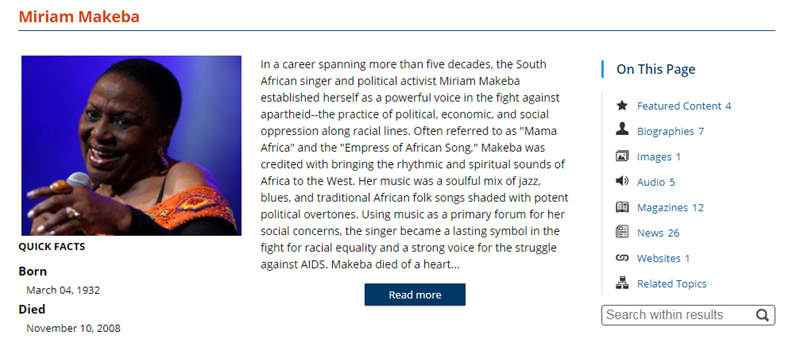| By Traci Cothran |
Inspiration for life-long learning comes from all kinds of places. Recently my teen got tickets to a music concert by the French artist, Jain. I knew nothing of her or her music, but played my role as the transportation provider for this event. The show, it turned out, was great—Jain’s music reflects her diverse background and incorporates rap, pop, and African and Arabic influences. One of her unique songs is entitled “Makeba” and it’s a catchy one (it was also featured in a recent Levi’s commercial).
Curious to know more about this song, I did a bit of research to find out it’s about Miriam Makeba, who was a singer and activist from South Africa. I read about her colorful history in Gale In Context: Biography: She spoke out through her songs, was exiled from her homeland for decades, she married (and later divorced) Black Panther Stokely Carmichael/Kwame Ture, she spoke at the United Nations against apartheid, and she toured with Paul Simon, among many other things. She was the first African music superstar, the first African woman to win a Grammy, and she inspired people around the globe (pre-internet age).
I listened to some clips of her singing in audio articles in Gale In Context: Global Issues, and her voice is a powerhouse indeed. I read many tributes to “Mama Africa” and her work that followed her death in 2008, including the one where Toronto filmmaker Calvin Butler notes, “She was the catalyst for what became the black consciousness movement … especially for black women, whose idea of beauty, at the time, was based on Eurocentric concepts” (“‘Mama Africa’ will truly be missed; Songstress Miriam Makeba was seen around the globe as a political icon,” The Spectator, November 20, 2008). In our eBook platform, Gale eBooks, there are over 200 matches for a search on Makeba, so there’s much to be gleaned from those ebook sources.
Then I logged into my public library account and requested a few more resources: one of Makeba’s albums on CD, her autobiography, and a beautifully illustrated biography for children that’s complete with a timeline of her life as well as further reading. I plan on learning even more about this wonderful woman (and sharing it with my kid) and the legacy she’s left behind through her foundation mariammakeba.org.
So I’m pleased to report that my transportation gig not only opened my eyes to some new music, but to an important bit of history I would have missed otherwise. And to me, this is what life-long learning and the critical role of libraries in those efforts is all about. THANK YOU, PUBLIC LIBRARIES!
What learning have you experienced from your library lately?

Meet the Author
Traci Cothran is a manager in Gale’s Database Program and a history buff, so she can often be found watching videos from the early 1900s in Gale’s World History In Context.


